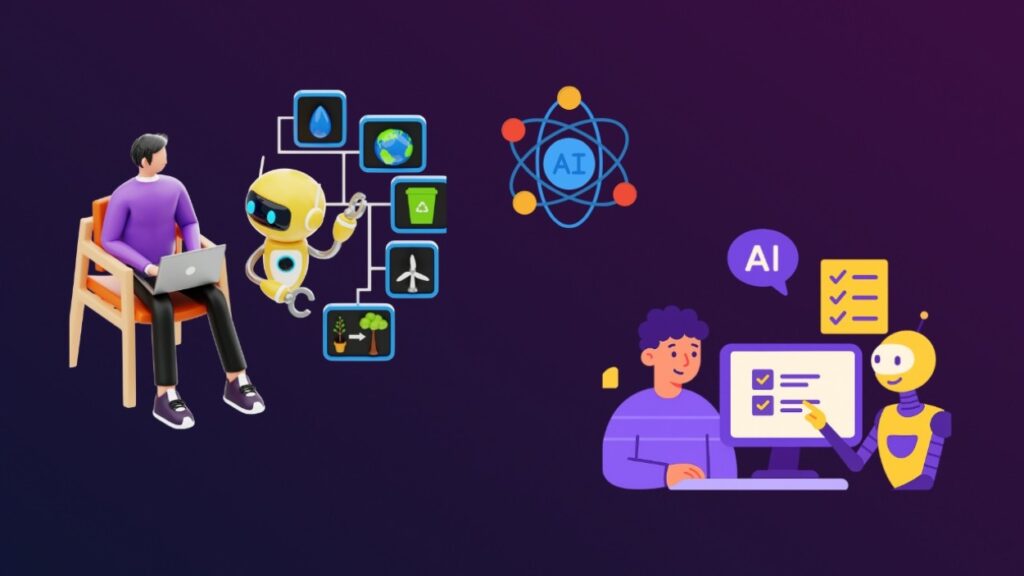AI is reshaping marketing with measurable results and day-to-day integration. 88% of marketers reported using AI in their daily work. Brands are applying AI to personalize customer experiences, optimize campaigns, and automate workflows. For example, e-commerce platforms use AI-powered recommendation engines to drive 31% of their revenue, while small US businesses report saving 14 hours weekly and over $5,000 monthly through AI tools.
Editor’s Choice
- 88% of marketers use AI in their day-to-day roles.
- The AI marketing tech sector reached $107.5 billion in 2025, up from $15.8 billion in 2021.
- The global AI marketing industry stands at $47.32 billion in 2025, growing from $12.05 billion in 2020.
- 86% of brands say AI has significantly improved personalization.
- AI-powered recommendation engines generate 31% of e-commerce revenue.
- 78% of organizations used AI in at least one business function in 2024, up from 55% in 2023.
- U.S. private investment in AI reached $109.1 billion in 2024.
Recent Developments
- U.S. private AI investment surged to $109.1 billion in 2024, vastly eclipsing China’s $9.3 billion.
- AI use across business functions rose to 78% in 2024, from 55% in the prior year.
- Marketing and IT saw the biggest jumps in AI adoption among business functions.
- The global AI market is now valued at $391 billion in 2025, projected to reach $1.81 trillion by 2030, CAGR 35.9%.
- In the U.S., the AI market is valued at $73.98 billion in 2025, with a projected CAGR of 26.95% through 2031.
- AI content creation continues to rise; 54% of content marketers use AI for idea generation, up from 43%, though only 6% use it to write full articles, up from 3%.
AI Adoption in Marketing
- 88% of marketers use AI daily in their roles.
- 57% of enterprise marketing teams (1,000+ employees) are exploring AI in 2024, compared to 40% of smaller teams.
- 78% of organizations use AI in at least one function.
- 71% of organizations regularly use generative AI, up from 65% earlier in the year.
- About 7% of U.S. firms currently use AI, though adoption is steadily increasing.
- 92% of businesses plan to invest in generative AI over the next three years.
- Around 84% of e-commerce businesses in 2025 are integrating or planning to integrate AI.
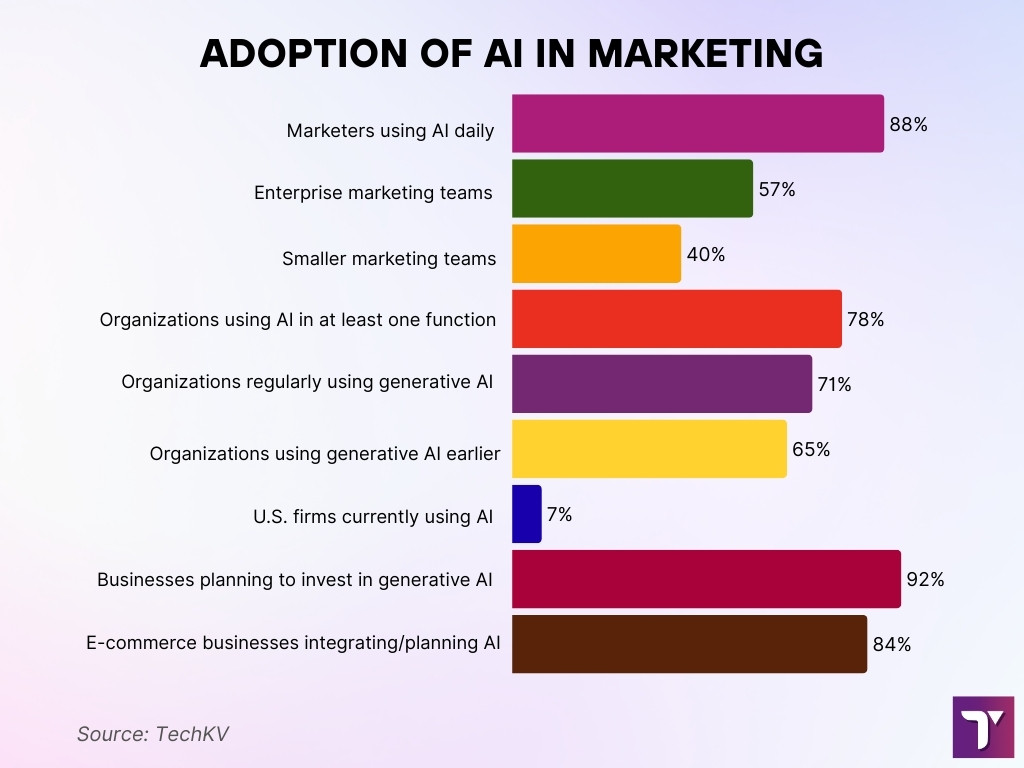
Growth of The AI Marketing Market
- The AI marketing sector grew from $15.8 billion in 2021 to $107.5 billion in 2025.
- The global AI marketing market is valued at $47.32 billion in 2025, up from $12.05 billion in 2020.
- The generative AI market is $62.75 billion in 2025, expected to hit $356.05 billion by 2030, CAGR 41.52%.
- The overall global AI market is valued at $391 billion in 2025, aiming for $1.81 trillion by 2030.
- U.S. AI market, $73.98 billion in 2025, with a CAGR of 26.95% through 2031.
AI Applications in Marketing
- 86% of brands improved personalization thanks to AI in 2025.
- AI recommendation engines contribute 31% of e‑commerce revenue.
- Real-time product suggestions boost conversion rates by 29%.
- 79% of marketers personalize emails using AI based on past behaviors.
- AI dynamic pricing increased sales by 12% across sectors.
- 48% of mobile push notifications are now AI-personalized.
- Personalized landing pages (AI-driven) lowered bounce rates by 33%.
- AI-powered loyalty programs increased customer retention by 27% in 2025.
- Lookalike audience creation via AI improved acquisition targeting by 28%.
- 60% of businesses automate lifecycle segmentation using AI models.
AI-Driven Personalization Statistics
- 86% of brands saw significant personalization gains through AI in 2025.
- AI recommendations account for 31% of e‑commerce revenue.
- Personalized suggestions raised conversion rates by 29%.
- 79% of marketers personalize email content using AI.
- AI-enabled dynamic pricing boosted sales by 12%.
- 48% of mobile push messages are AI-personalized.
- AI-designed landing pages reduced bounce rates by 33%.
- AI in loyalty programs lifted retention by 27% in 2025.
AI Adoption and Market Growth Insights
- 88% of marketers use AI daily in their roles, reflecting its deep integration in everyday marketing workflows.
- 57% of enterprise marketing teams (1,000+ employees) are exploring AI in 2024, compared to 40% of smaller teams.
- 78% of organizations now use AI in at least one business function, showing widespread operational integration.
- 71% of companies regularly use generative AI, a rise from 65% earlier in the year, indicating growing trust and usage.
- Only 7% of U.S. firms currently use AI, but adoption is steadily increasing, especially among forward-looking businesses.
- 92% of businesses plan to invest in generative AI over the next three years, signaling a significant surge in adoption and innovation.
- Around 84% of e-commerce businesses in 2025 are either integrating or planning to integrate AI, emphasizing its role in future digital commerce.
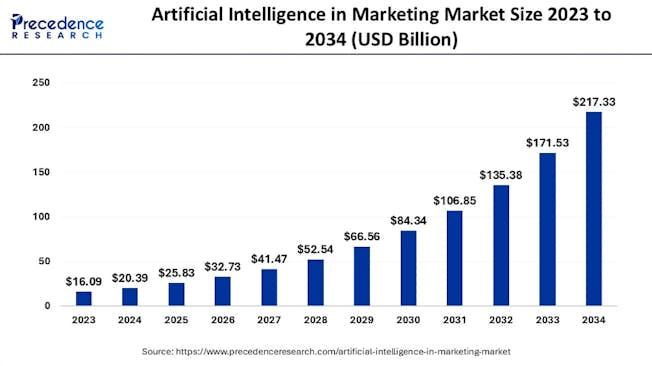
Content Creation Statistics
- 54% of content marketers now use AI for idea generation, up from 43% last year, though only 6%, up from 3%, use it to write full articles.
- 55% of marketers report using AI tools for content creation, including blogs and social posts.
- Over 74% of new webpages include AI-generated content.
- 86% of marketers say AI saves them more than one hour daily on content ideation tasks.
- Nearly 20% of marketers allocate over 40% of their content marketing budgets to AI-powered initiatives.
- In small businesses, 67% have adopted at least one AI tool, with 42% reporting significant growth, and nearly 80% say content quality improved.
- 68% of companies noticed improved content marketing ROI after using AI.
- 65% of companies achieved better SEO results through AI.
Impact on Marketing ROI
- Companies deeply investing in AI see a 10–20% increase in sales ROI on average.
- Leading firms using AI recorded 1.5× higher revenue growth and 1.4× higher returns on invested capital over three years.
- Marketing teams deploying AI solutions report an impressive 300% average ROI, driven by revenue gains and operational savings.
- These teams also report 40% higher conversion rates and 35% increases in average order values.
- McKinsey found AI-enabled advertising campaigns deliver 30% higher ROI.
- Companies report 10–20% higher ROI and 60% lower campaign costs when automating targeting and decision-making with AI.
Customer Experience
- In 2025, 65% of senior executives view AI and predictive analytics as primary growth drivers.
- 53% report significant team efficiency improvements, while 50% say AI sped up ideation and content production.
- MIT found that only around 5% of enterprise generative AI pilots delivered rapid P&L impact, highlighting a 95% failure rate in measurable outcomes.
- AI-generated personalization in beauty marketing, e.g., micro-segmented campaigns, could boost conversion rates by 40%.
- Bain & Co projects that hyper-personalized, AI-led advertising can raise return on ad spend by 10–25%.
Marketing Automation Statistics
- At the Inbound 2025 conference, HubSpot launched “The Loop” AI marketing framework, which includes tools like 15+ Breeze AI agents that tap into CRM data to enhance customer engagement.
- AI influencers and avatars are gaining popularity. For instance, hyper-realistic AI personas, enabled by tools such as Synthesia and Fameflow AI, are becoming scalable alternatives to human creators, though human engagement still leads.
- Meta’s AI-powered recommendation engine for Reels led to a 5% boost in ad conversion rates. Meta’s generative AI tools are used by around 5 million advertisers, with AI-driven ad revenue projected to increase by up to $28 billion annually by 2030.
Use of Chatbots in Marketing
- The global chatbot market is valued at $15.57 billion in 2025 and is expected to reach $46.64 billion by 2029, CAGR ~24.5%.
- Over 987 million people currently use AI chatbots.
- The North American market holds 31% of global chatbot spending.
- By 2025, 95% of customer interactions are expected to be handled by AI, yielding an ROI of 148–200% and over $300,000 in annual cost savings for leading implementations.
- Business use of AI chatbots is expected to grow by 34% by the end of 2025.
- Forecasts estimate chatbot adoption will push the market value, highlighting strong traction in automation.
- Another source projects the chatbot market rising from $7.76 billion (2024) to $27.29 billion by 2030, CAGR ~23.3%.
AI‑Powered Predictive Analytics in Marketing
- 65% of senior executives cite AI and predictive analytics as key to 2025 growth.
- Predictive analytics is being framed as essential for outperforming competitors, letting marketers anticipate success before campaigns launch.
- AI-driven sentiment analysis systems are achieving 89.7% accuracy on large-scale e‑commerce datasets, improving engagement and efficiency.
- AI-generated metadata, when co-created and refined by humans, increased video watch time by 7.1% and watch duration by 4.1% on UGC platforms.
AI in Social Media Marketing
- Nearly 90% of advertisers are already using, or will soon use, gen‑AI to build video ads. By 2026, gen‑AI is expected to account for 40% of all video ads.
- AI influencers, digital personas, are gaining traction in marketing campaigns, offering cost-effective and interactive brand alternatives while raising questions about authenticity.
- HubSpot’s AI framework underscores a shift from chasing clicks to building trust via expressive, tailored, and amplified content strategies.
AI in Social Media Investment Growth
- Investment in AI within social media platforms is showing consistent year-over-year growth.
- In 2022, investment stood at $1.5 billion, marking the early stages of accelerated AI integration in the sector.
- By 2024, investment nearly doubled, reaching $2.8 billion.
- The upward trend continues into 2025, with investment climbing to $3.5 billion.
- A significant rise is observed in 2026, where funding hits $4.2 billion, showcasing growing confidence in AI capabilities.
- 2027 sees AI investments reaching $5.0 billion, highlighting its critical role in content moderation, recommendation engines, and targeted advertising.
- By 2028, investment grows further to $6.1 billion, followed by $7.3 billion in 2029.
- A steep rise occurs by 2030, with figures hitting $8.8 billion.
- The highest investment projection is in 2031, reaching $10.5 billion, indicating a sevenfold increase from 2022.
- This growth underlines the strategic importance of AI in driving innovation, engagement, and monetization across social media platforms.
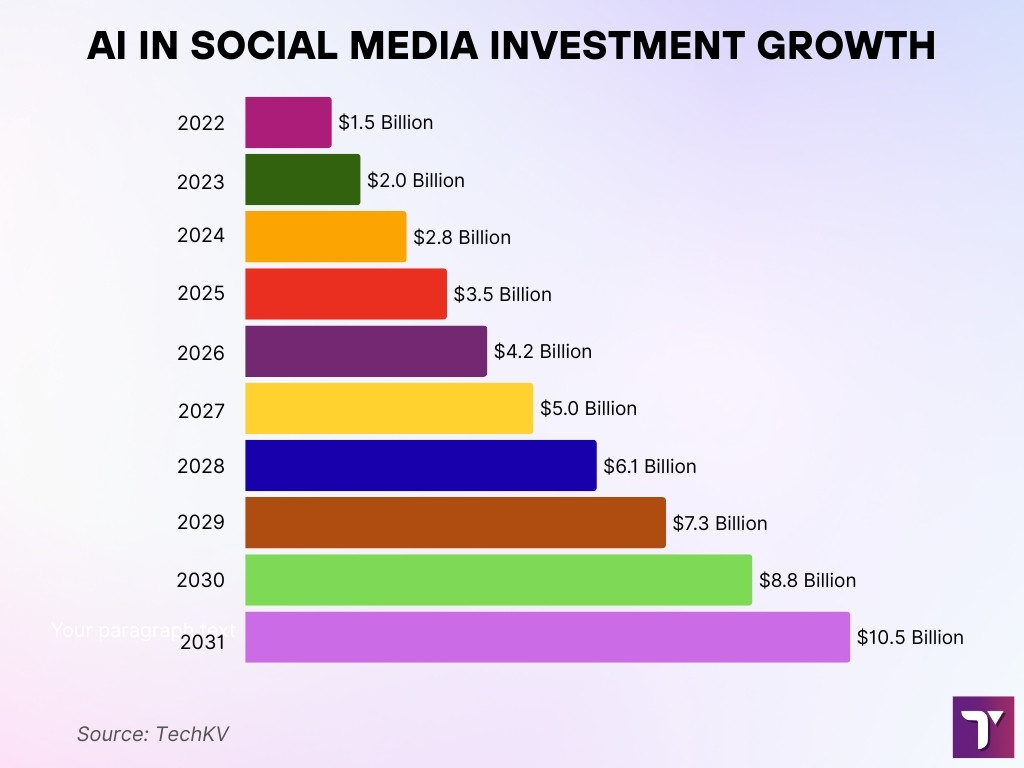
AI Marketing Tools Usage Statistics
- 56% of marketers already actively implement AI in their companies in 2025, and 60% of marketing departments globally will integrate at least one AI technology by year-end.
- 30% of marketing messages from large companies are expected to be AI-generated by the end of 2025.
- AI-optimized email subject lines and segmentation helped 41% of marketers achieve higher conversion rates.
- Small businesses use AI tools for blog posts (58%), social posts (55%), short articles (49%), video clips (31%), and emails (29%).
- 68% of small businesses plan to invest in AI for content marketing and SEO.
- 67% say AI-made landing pages attract more customers.
- Over 74% of new webpages include AI-generated content.
- 86% of marketers report that AI saves them more than an hour each day on content ideation.
Challenges in AI Marketing Implementation
- 50% of marketers foresee rising performance expectations tied to AI.
- 49% expect changes in marketing tools or software due to AI shifts.
- 48% see potential changes in strategy or direction from AI adoption.
- 31% cite concerns over AI’s accuracy and quality.
- 39% are unsure how to use generative AI safely.
- 43% don’t know how to leverage generative AI for maximum value.
- 70% report employers don’t offer gen‑AI training.
- Ethical risks, AI-generated slogans show bias by demographic, stressing the need for fairness audits.
- Consumer privacy & fairness remain major concerns, requiring transparency and data protection in AI systems.
Consumer Attitudes Toward AI Marketing
- 69% of marketing professionals feel excited about AI, while 17% are both excited and worried.
- 60% are very optimistic about industry direction, and only 1% are very pessimistic.
- Awareness, 44% know AI can create marketing content, but only 25% think they can recognize AI‑generated content.
- Just 28% understand how personal data is used by AI for personalization.
- Heavy AI users (10+ uses/month) are only 20% of Americans; 95% still use search engines regularly.
- Only 32% of U.S. consumers trust AI-driven services, compared to 72% in China.
- Millennials outpace Gen Z as daily AI “super users” (18–40 age group holds ~60%) and use AI actively for tasks like scheduling, shopping, and summarizing.
AI and Search Engine Optimization (SEO)
- AI Overviews had 1.5 billion monthly users in Q1 2025, nearly 27% of all internet users.
- These Overviews reduce website clicks by 34.5%.
- 47% of Google searches include AI Overviews, and 87.6% of those rank in the #1 position.
- AI searches have reduced organic web traffic by 15%–25%.
- AI-generated overviews appear across 12.8% of search results by volume.
- By June 2025, some AI Overviews began appearing below the top result, sometimes improving click-through for those ranking pages.
- The trend toward Generative Engine Optimization, GEO, pressures brands to optimize content for AI engines, not just human readers.
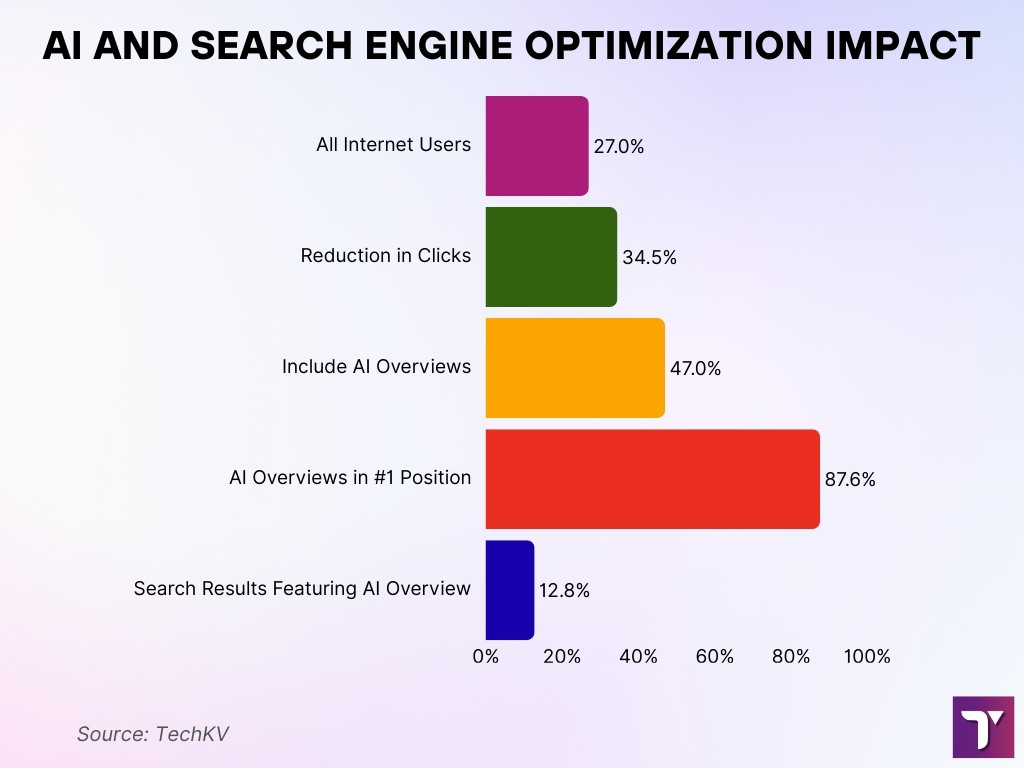
Industry-Wise AI Marketing Statistics
- Retail and e-commerce, AI personalization powers up to 31% of revenue through recommendations.
- Beauty, AI boosts conversion in hyper-personalized campaigns by 40% and improves ROAS by 10%–25%.
- Advertising, Programmatic display advertising, with AI optimization, reached $202 billion in 2024, projected to hit $861 billion by 2033.
- Digital agencies, AI video ads, and generative content are reshaping ad production, significantly reducing costs and timelines.
- E-commerce, AI shopping agents from OpenAI, Google, Microsoft, and others are starting to perform purchases on consumers’ behalf, requiring brands to shift SEO strategies.
Future Trends in AI Marketing
- Google is embedding more ads into AI-driven search answers, AI Overviews, and AI Mode, signaling new ad opportunities and revenue paths.
- Meta plans to offer fully AI-powered advertising creation by the end of 2026, covering images, videos, text, and targeting.
- The infrastructure of e‑commerce is shifting; checkout and visibility now happen within AI interfaces, not brand sites.
- Generative Engine Optimization, GEO, is emerging as a new SEO tactic, optimizing for AI answers, not just search pages.
- AI influencers and avatars are rising in popularity, scalable but also sparking ethical debates over authenticity and brand storytelling.
- Globally, the AI market value is projected to grow nearly fivefold, from $758 billion in 2025 to $3.7 trillion by 2034. Generative AI alone is $644 billion and rising 76% over 2024.
- 83% of companies say AI is a top priority. By 2025, 97 million people may work in the AI space.
Conclusion
AI marketing has officially gone mainstream, with most marketing teams already using AI tools for content creation, personalization, and workflow automation. But along with this opportunity comes increased scrutiny. Brands must now overcome challenges such as accuracy, training limitations, ethical bias, consumer trust, and adapting to a rapidly shifting digital landscape.
Long-term success depends on using AI to enhance, not replace, human creativity, while prioritizing transparency, robust data infrastructure, and consumer foresight. As AI agents transform traditional customer journeys and search habits, marketers must evolve with strategies like GEO, AI-powered advertising, and ethical personalization to stay ahead. Ultimately, AI is no longer just a tool; it’s redefining the entire foundation of modern marketing. Let this guide shape your next AI-driven leap.
